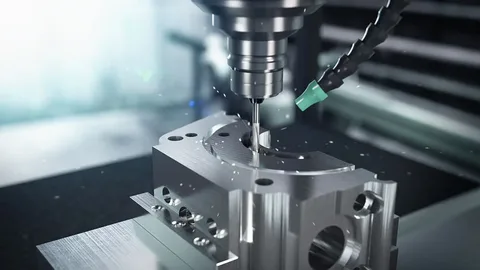Why CNC Machining Is Essential for Aerospace and Automotive Industries

In the fast-paced and highly competitive sectors of aerospace and automotive manufacturing, precision, consistency, and efficiency are essential. CNC (Computer Numerical Control) machining has become a pivotal technology for both industries, allowing manufacturers to meet strict tolerances and produce complex components with remarkable precision. This article will explore the role of CNC machining in these industries, highlighting why it’s indispensable, the benefits it offers, and its impact on the quality and reliability of manufactured parts.
The Role of CNC Machining in Precision Manufacturing
In aerospace and automotive industries, the demand for high-precision components is non-negotiable. Even the smallest discrepancy in dimensions can lead to significant performance issues or, worse, safety hazards. CNC machining provides the precision needed by leveraging computer-controlled systems that dictate exact movements, ensuring components meet stringent tolerances. This level of precision is essential for parts that must withstand extreme conditions, like high temperatures, high pressures, and constant friction.
CNC machining also offers consistency that manual manufacturing processes cannot match. By following precise digital blueprints, CNC machines can replicate the exact specifications for each component, regardless of the complexity of the design. This repeatability is invaluable in the aerospace and automotive sectors, where identical parts are needed in high quantities. Each component crafted through CNC machining meets the same standards, reducing the risk of human error and creating a streamlined production process.
Efficiency and Cost-Effectiveness of CNC Machining
One of the primary benefits of CNC machining is its ability to improve production efficiency. Unlike traditional machining processes that require frequent adjustments and manual intervention, CNC machines can operate continuously with minimal downtime. This automation accelerates production timelines and optimizes the manufacturing workflow, which is crucial in industries with high production demands. Reduced setup times and automated tooling also contribute to higher efficiency, enabling companies to meet tight deadlines without compromising quality.
Additionally, CNC machining proves to be cost-effective over time. While the initial investment in CNC equipment and software can be substantial, the long-term savings are significant. Automated machining reduces labor costs and minimizes waste materials due to its high accuracy, which translates into cost savings in both raw materials and manufacturing time. As a result, CNC machining is not only efficient but also financially viable for aerospace and automotive manufacturers seeking to maximize their return on investment.
Material Versatility in CNC Machining
A notable advantage of CNC machining is its compatibility with a wide range of materials, making it ideal for both aerospace and automotive applications. In the aerospace industry, materials like titanium, aluminum, and carbon composites are commonly used because of their strength-to-weight ratios and durability. CNC machines can effectively handle these materials, ensuring precise cuts and shapes without compromising the integrity of the material. This versatility enables manufacturers to produce lightweight, durable parts that are essential for flight performance and safety.
In the automotive sector, CNC machining is equally adaptable, accommodating various metals, plastics, and alloys. Each material brings unique benefits to automotive components, such as durability, flexibility, and heat resistance. CNC machining allows for complex shapes and contours to be crafted from these materials, producing parts that are not only functional but also aesthetically appealing. With its ability to handle diverse materials, CNC machining supports innovative designs and helps manufacturers meet evolving industry standards.
Enhanced Quality Control and Testing Capabilities
Quality control is a critical aspect of both the aerospace and automotive industries, where component failure can have serious consequences. CNC machining facilitates rigorous quality control by providing precise and accurate manufacturing processes. With CAD (Computer-Aided Design) and CAM (Computer-Aided Manufacturing) integration, CNC machines follow detailed specifications that eliminate variability in production. This consistency simplifies quality assurance procedures and ensures that each part meets the required standards before it leaves the factory.
Moreover, CNC machining enables manufacturers to conduct in-process testing and validation, identifying and addressing issues early in the production process. Automated monitoring systems in CNC machines can detect anomalies, allowing operators to make real-time adjustments and maintain product integrity. This proactive approach to quality control is crucial in industries where safety and performance are paramount. By enhancing quality control, CNC machining minimizes the likelihood of defective parts reaching the market, reinforcing trust in aerospace and automotive brands.
Future of CNC Machining in Aerospace and Automotive Industries
As technology advances, CNC machining continues to evolve, introducing new capabilities that are expected to shape the future of aerospace and automotive manufacturing. Developments such as 5-axis CNC machines allow for more complex part geometries to be manufactured with fewer setups, enhancing efficiency and enabling more intricate designs. Additionally, the integration of AI and IoT within CNC machining systems is transforming the industry, allowing machines to optimize their own performance and further improve production accuracy.
With the rise of electric vehicles and new aerospace technologies, CNC machining will play an even more critical role in meeting the demand for innovative and lightweight components. Electric vehicle components, for instance, often require tight tolerances and unique materials to optimize energy efficiency and performance. Similarly, advancements in aerospace technology demand new approaches to component manufacturing. CNC machining is expected to adapt to these changes, maintaining its relevance and essential role in these dynamic industries for years to come.
Conclusion
CNC machining is a cornerstone of modern manufacturing, particularly in industries where precision, reliability, and efficiency are paramount. For the aerospace and automotive sectors, CNC machining provides the technology and processes necessary to meet these high standards. Its adaptability to different materials, cost-effectiveness, precision, and quality control capabilities make it indispensable. As both industries continue to innovate and grow, CNC machining will undoubtedly play an essential role in pushing the boundaries of what is possible, driving forward advancements in performance, safety, and sustainability.
- Art
- Causes
- Crafts
- Dance
- Drinks
- Film
- Fitness
- Food
- Jocuri
- Gardening
- Health
- Home
- Literature
- Music
- Networking
- Alte
- Party
- Religion
- Shopping
- Sports
- Theater
- Wellness


